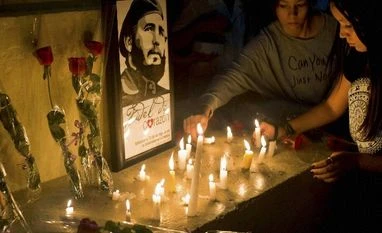In hundreds of schools, hospitals and public buildings, Cubans signed a "solemn oath" to defend the revolution following the death of communist leader Fidel Castro.
Instead of leaving messages in books of condolence, Cubans were invited to endorse the "concept of the revolution" defined by Castro in a speech in 2000, six years before illness forced him to hand power to his brother, Raul.
"We will keep fighting for these ideas. We swear!" says the oath to which Cubans signed their names yesterday, three days after Castro died at age 90.
While Cubans lined up to sign the oath cross the island, hundreds of thousands flocked to Havana's Revolution Square to pay tribute to Castro at a memorial installed inside the monument to independence hero Jose Marti.
Leonard Guijarro used his iPad to record the memorial, which consisted of white roses flanking a picture of a young, black-bearded Fidel in military fatigues during the guerrilla war.
Guijarro may have immortalised the moment with a US-made modern gadget and worn Adidas sneakers, but the 22-year-old university history student shared the firm belief and desire of other Castro supporters that his revolution will live on after his death.
"Fidel has died but he is among us," he said after he filed past a picture of Castro inside the monument to independence hero Jose Marti at Havana's Revolution Square on Monday.
"There's a Fidel in every Cuban citizen," said Guijarro, who like many recalled that Castro brought free education and health care to the island after ousting dictator Fulgencio Batista in 1959.
Several generations of Cubans streamed past the memorial: university students wearing the latest fashion, veterans in military fatigues, boys and girls in school uniforms, couples pushing strollers, retirees consoling each other.
While dissidents label Castro a dictator who jailed or forced detractors into exile, for "Fidelistas" he could do no wrong.
"He cared for Cubans like a father who cares for his children," said 52-year-old economist Norma Maria Diaz la Torre, whose husband wrapped his arm around her shoulder as she cried after viewing the portrait.
Instead of leaving messages in books of condolence, Cubans were invited to endorse the "concept of the revolution" defined by Castro in a speech in 2000, six years before illness forced him to hand power to his brother, Raul.
"We will keep fighting for these ideas. We swear!" says the oath to which Cubans signed their names yesterday, three days after Castro died at age 90.
More From This Section
"The signature shows the desire of Cubans to make this socialist revolution irreversible," said retired lieutenant colonel Rigoberto Cerolio at a school in Havana.
While Cubans lined up to sign the oath cross the island, hundreds of thousands flocked to Havana's Revolution Square to pay tribute to Castro at a memorial installed inside the monument to independence hero Jose Marti.
Leonard Guijarro used his iPad to record the memorial, which consisted of white roses flanking a picture of a young, black-bearded Fidel in military fatigues during the guerrilla war.
Guijarro may have immortalised the moment with a US-made modern gadget and worn Adidas sneakers, but the 22-year-old university history student shared the firm belief and desire of other Castro supporters that his revolution will live on after his death.
"Fidel has died but he is among us," he said after he filed past a picture of Castro inside the monument to independence hero Jose Marti at Havana's Revolution Square on Monday.
"There's a Fidel in every Cuban citizen," said Guijarro, who like many recalled that Castro brought free education and health care to the island after ousting dictator Fulgencio Batista in 1959.
Several generations of Cubans streamed past the memorial: university students wearing the latest fashion, veterans in military fatigues, boys and girls in school uniforms, couples pushing strollers, retirees consoling each other.
While dissidents label Castro a dictator who jailed or forced detractors into exile, for "Fidelistas" he could do no wrong.
"He cared for Cubans like a father who cares for his children," said 52-year-old economist Norma Maria Diaz la Torre, whose husband wrapped his arm around her shoulder as she cried after viewing the portrait.
)